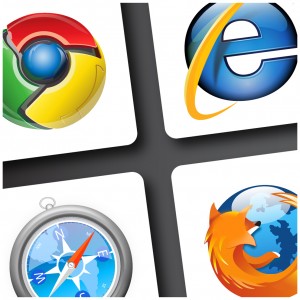Since the 80s, your operating system choices have been Windows, maybe Apple if you were daring, or Linux if you were the type who likes to tinker. We all know who the clear winner has been. Windows has dominated the OS landscape since it released Windows 95. However, Microsoft’s reign may be coming to an end. The next war for platform dominance is upon us…it’s your Web browser.
It may seem far-fetched, but if you’ve ever used Gmail or Google Docs, you’ve already sampled the idea of running applications directly in your browser and may not have even realized it.
In May, Google announced Google Gears, which is a plugin that helps websites run more full-featured, application-style pages through a browser and includes the ability to use them offline. The thinking is…with Gears you should be able to run any type of application without having to install the app on your desktop. This includes anything from a word processing app (Google Docs) to email (Gmail or MySpace messaging) to video. It’s still a work in progress, but the early results are promising.
Gears works on several platforms, but Google felt it needed a multi-threaded platform that could throttle these Java virtual machines (JVM) and separate them within the browser. The thought being, if one of these JVMs started running away or wanting to crash, Chrome (Google’s new Web browser) could shut it down before it brought down the whole browser.
Firefox, Safari and Internet Explorer users can appreciate that. Enter Chrome. Google markets the new browser as a fun, new, easy way to surf the Web, but hidden under the fluff is a sleek weapon with purpose. The perfect example of form meets function. Google produced a Web browser to accentuate Gears features and make Web applications that use Gears scream, like Google Docs and Gmail.
At first thought, I wondered why Google would try to undercut all of its work on the development of Firefox, an open source browser by Mozilla. Google is the largest financial contributor to the popular Mozilla browser. It was only after I started digging into the concepts behind Chrome that I started to understand, Google is taking direct aim at Microsoft Windows and Office.
Imagine the ability to run the exact same application – whether at home or at work, online or offline, on Windows, Mac or Linux – and have the exact same look and feel no matter which operating system you are running. For example, if you use Google Docs on your Windows PC at the office and save all your work, go home and fire Google Docs on your Mac, you have the same exact look and feel. Same menus, everything.Once again, Google excels in making the simply impossible, simply doable.
This concept puts pressure on the industry titans to make stable, lean operating systems, because that will be the basis for PC purchases going forward. Asking yourself, “Will this machine run my office suite?” will be a thing of the past. The question will be, “Which Web browser should I run?”
Google isn’t the only company working on these rich Internet applications (RIA) and plugins. Adobe and Mozilla are also working on their own offerings, which would offer the same type of experience. Each flavor is a little different, but the ideas are mostly the same.
Most of these new tools leverage AJAX, a Web development platform, which can asynchronously retrieve server data in the background without requiring a refresh. This makes an RIA seem more like a desktop application because it refreshes data in real-time. You can read more about Adobe Air, Google Gears and Mozilla Prism, and in some cases see them in action. For a good demo on Gears, sign up for Google Docs, choose offline settings, install Gears and take a test drive.If you haveGmail account, sign up for Docs under your settings menu.